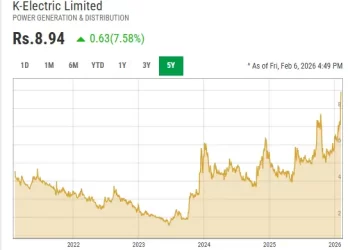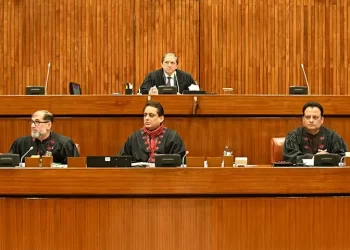Taiwan’s military fired dozens of shells off its southern coast on Tuesday in a simulation of a defense of the island, as Taiwan followed up nearly a week of Chinese military drills with preplanned defensive maneuvers of its own.
Taiwan kicked off its two-day military exercise—known as Tianlei, which can be loosely translated as “Heaven’s Thunder”—with an hour-long live-firing drill involving more than 700 troops, according to Taiwan’s Eighth Army Corps, with 38 howitzers firing 114 shells into the waters.
The annual drills, while planned months in advance, come amid tensions across the Taiwan Strait that are their highest in decades. China’s Communist Party, which claims Taiwan as part of its territory, was angered by a visit to the island last week by U.S. House Speaker
Nancy Pelosi,
the highest-ranking visit by a U.S. official in a quarter-century.
In response, China’s military, the People’s Liberation Army, said that it would stage four days of military exercises around Taiwan’s main island, which Taiwanese and Chinese defense ministries said showed China seeking to establish an air and sea blockade and simulating an attack on the island.
On Monday, Beijing said it was indefinitely extending its Taiwan drills, which have disrupted one of the busiest shipping and air trade routes in the region. The PLA’s Eastern Theater Command, which oversees operations closest to Taiwan, said Monday’s drills focused on joint anti-submarine and sea assault operations around the island, while Tuesday’s joint air and sea exercises were focused on containment and support.
“Drills like these will not stop and are expected to become routine until reunification, as the Chinese mainland shows its determination to push forward the reunification process,” read an article published Monday in the Global Times, a state-run tabloid, citing unnamed experts.
“The drills not only lock the island from inside out, but also from the outside in, telling external forces that the PLA has powerful area denial capabilities in the region that even the U.S. cannot rival,” the article continued.
A helicopter under the Eastern Theater Command of China’s People’s Liberation Army taking part in military exercises around Taiwan on Monday.
Photo:
EASTERN THEATER COMMAND/via REUTERS
In a news release Tuesday, Taiwan’s defense ministry said China extending its drills beyond the original four-day duration showed that the threat of force hadn’t diminished.
Meanwhile, Taiwan Foreign Minister
Joseph Wu
described China’s extension of its four-day exercises as a sign that Beijing couldn’t be trusted.
“Its ambitions and impact is extending far beyond Taiwan,” Mr. Wu told reporters in Taipei on Tuesday, pointing to Beijing’s growing influence in the South Pacific and throughout and beyond Asia. He described Mrs. Pelosi’s visit as merely an excuse for China’s actions around Taiwan.
“If you look at the preparation of its military exercises, including missiles, large-scale naval and air joint military exercises, drones, cyberattacks, disinformation campaigns, economic coercion, all of these combined—this isn’t something you can prepare in a matter of days,” he said. “China has been preparing for this for a long time.”
Alessio Patalano, a professor of war and strategy in East Asia at King’s College London, said announcing an extension to the exercises appeared to be part of Beijing’s psychological warfare strategy.
The PLA’s annual summer exercises have traditionally lasted two to three weeks, and the Taiwan drills, which serve as those exercises this year, should be no different, Mr. Patalano said. By framing what the PLA had already planned to do as “an extension,” he said, Beijing was able to accomplish three goals: “Scare the Taiwanese, put the Americans in their place, and advance their point of view in changing the status quo, preventing any others from doing anything about it.”
A day earlier in Beijing, Chinese Foreign Ministry spokesman
Wang Wenbin
played down the extension of the military exercises. “China’s position is justified, reasonable and lawful; our measures are firm, strong and measured; and China’s military exercises are open, transparent and professional,” he said.
Before Mrs. Pelosi’s trip, Chinese leader
Xi Jinping
had warned President Biden during a phone call of unspecified countermeasures should her visit proceed. Mrs. Pelosi had also been warned in briefings with senior White House and Pentagon officials about the lasting damage her trip could cause to U.S.-China relations, though she was never asked to scotch the trip entirely, according to a U.S. official with knowledge of the discussions.
On Tuesday, 45 Chinese warplanes and 10 warships were involved in a joint operation near Taiwan, Taiwan’s defense ministry said in a release, adding that 16 of the aircraft crossed the so-called median line that bisects the Taiwan Strait, a notional boundary that Taipei says demarcates areas of de facto control but which Beijing says it doesn’t recognize.
“The median line has a psychological meaning,” said Shu Hsiao-huang, a Taipei-based associate research fellow at the military-backed Institute for National Defense and Security Research.
“If [Chinese planes] enter our airspace and we don’t prepare a response,” Mr. Shu said, “it’s like throwing a frog into boiling water.”
Taiwan’s military fired flares on Tuesday.
Photo:
ritchie b tongo/Shutterstock
Write to Joyu Wang at joyu.wang@wsj.com and Karen Hao at karen.hao@wsj.com
Copyright ©2022 Dow Jones & Company, Inc. All Rights Reserved. 87990cbe856818d5eddac44c7b1cdeb8








